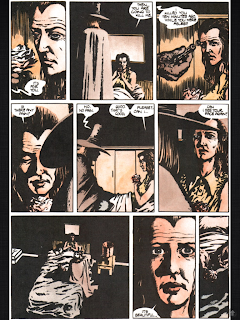V for Vendetta, by Alan Moore, is a work which I initially found quite difficult to read due to its somewhat hackneyed construction in both the narrative and artistic realm (appropriately enough, the book's preface is essentially an apology by Moore regarding the beginning of the work's unsteady foundation).
The titular character, V, is a frank and astounding bundle of theatrics and domestic terrorism, a faceless avatar of an immortal idea. V's selfless and ceaseless devotion to his adopted ideal borders on pathological autism, made all the stranger by V's shadowy past and casual erudition. The lengths that V goes to to manipulate and "save" his initially hapless co-conspirator are obscene, going far beyond the boundaries of what we would typically think of as "emotional and physical abuse", all in the service of a hazily-defined crusade which, miraculously, resolves itself quite neatly at the end - and all according to a grand and inhuman masterwork of a plan.
The hand-off at the end of the tale, from V to girl, physically echoes his earlier assertion - that you can kill the man, but not the idea. "Ideas are bulletproof."
Moore's use of the visual "pun" elements and interweaving "unrelated" writing with strangely coincidental imagery is at its peak throughout several issues, however, a theme that he would return to in Watchmen.





No comments:
Post a Comment